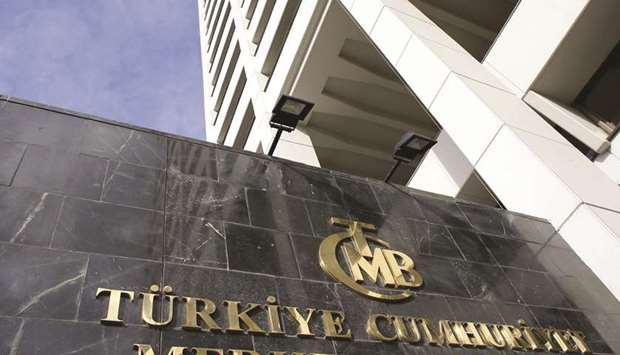Turkish policy makers’ steps to support the financial system helped bolster investor confidence and gave the nation’s financial sector a much-needed breather yesterday.
Turkish banking shares rose as much as 5.3%, snapping a three-day losing streak that wiped out almost 17% of their market value. The lira also jumped 5%, paring its losses over the past month to 26%.
The central bank on Monday stepped in to support the banking system by lowering the amount of money commercial lenders must park at the regulator. It also eased rules that govern how they manage their lira and foreign-currency liquidity. The banking regulator limited swaps transactions to help make shorting the currency more difficult.
Ali Fuat Erbil, chief executive officer of Turkiye Garanti Bankasi AS, praised the steps in an interview with NTV television yesterday. Turkey appeared to be approaching a “normalisation period,” but that doesn’t mean the “fire is out,” he said.
Erbil’s comments echoed those by Turkiye Is Bankasi CEO Adnan Bali, who said the steps were “the right moves in the right direction” in an interview on BloombergHT television a day earlier. Yesterday, Denizbank CEO Hakan Ates said the central bank had averted a “speculative attack” and that banks were ready for an organised stress test if needed.
There were also signs yesterday that business leaders were beginning to rally together to try and bring an end to Turkey’s market crisis and pressure the government to act.
An unusual joint declaration by business group Tusiad and the Turkish Chamber of Commerce laid out a roadmap that included tighter monetary and fiscal policy, a framework for relations with the European Union, an end to Turkey’s damaging political spat with the US and a long-term plan to end inflation.
Pledges by Treasury and Finance Minister Berat Albayrak on Sunday and by President Recep Tayyip Erdogan on Monday have also reassured investors that extreme measures such as capital controls weren’t on the table. Turkey would never seize deposits or forcibly convert foreign currency, Albayrak said in a statement published by Hurriyet newspaper. Erdogan later said that Turkey was committed to a free-market economy.
As of yesterday, signs of consumer alarm or mass withdrawals of foreign currency from banks had abated. Ates, the Denizbank CEO, said customers had started to buy liras again.
“The central bank’s moves should help with the liquidity needs of banks in both lira and FX during these volatile times,” said Cagdas Dogan, a banking analyst with BGC Partners in Istanbul, who said they’d be useful in the short term before “a much-needed stabilisation in the markets.”
Monday’s nearly 10% decline in the banking index sent valuations as measured by price-to-estimated earnings to 3.1 times, the lowest level on record.
As that happened, it looked like foreign investors were starting to pile back in, purchasing $93mn in Turkish stock ETFs trading in New York and London.

Turkey’s central bank headquarters in Ankara. The central bank eased rules that govern how they manage their lira and foreign-currency liquidity.
